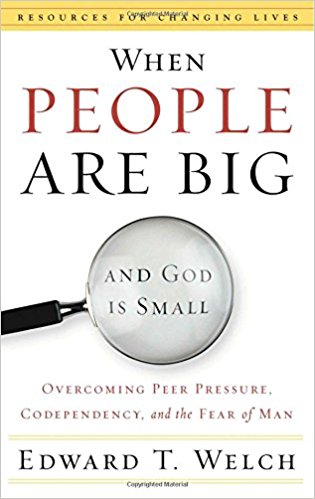 When People are Big and God Is Small: Overcoming Peer Pressure, Codependency, and the Fear of Man by Edward T. Welch, P & R Publishing, 1997. Published in cooperation with The Christian Counseling and Education Foundation.
When People are Big and God Is Small: Overcoming Peer Pressure, Codependency, and the Fear of Man by Edward T. Welch, P & R Publishing, 1997. Published in cooperation with The Christian Counseling and Education Foundation.
This past Sunday, during an excellent sermon drawn from the book of Romans, my pastor cited a term that was new to me: “imposter syndrome.” According to an article in Forbes magazine and other sources, this condition occurs when seemingly confident and capable people are plagued by the fear of being exposed as frauds. “Everyone thinks I’m so great. If they only knew!”
Sounds pretty normal to me! And very biblical, to boot. The Christian view of man says that we’re all incapable of saving ourselves and in desperate need of someone else to do it for us. and that someone is Christ. Our sinful nature explains why we’re so messed up when it comes to our reactions to both the accolades and the taunts of other people. We fear them more than we fear God. As I listened to the sermon I was reminded of this book and decided to use it for this week’s post.
Welch is a counselor and teacher with the Christian Counseling and Education Foundation. He’s written a number of other books; you can find out more about him here. He tells a very funny story about himself when he was a senior in high school. He thought he was up for an award in the end-of-year assembly, and he sat in the back sweating, hoping that his name wouldn’t be called. All he could think of was how everyone would look at him as he walked up to the platform. What if he tripped? Finally the award was announced. And it went to . . . someone else. Was he relieved? No. He was embarrassed about what all the people who had expected him to get the award thought of him now that he hadn’t.
I tell (yet another) story in my own book about my mom and her refusal to volunteer as a church counselor because she didn’t want people to look at her if she was up in front of the congregation. “Everyone will see how bent over I am!” she said when I suggested that she’d be good at this job. Well, guess what? Everyone could already see her. What difference did it make that they’d see her in a different place? It made no sense.
But I can think of plenty of times when I’ve done the same type of thing. There I sit, seeing something that should be done but too paralyzed to do it. (Such as turning down the speaker in our rehearsal room Tuesday night that was emitting distracting noises from the auditorium. I was pretty sure that the switches behind the director on the front wall were the right ones, but I just couldn’t bring myself to get up in front of everyone and take care of the problem. And it isn’t as if I don’t ever get up and talk in front of these people; I do it all the time when I make announcements. I just didn’t want to look foolish if I was wrong.) A small example of a big problem. Fear of man haunts us all.
Welch has sound ideas on how to handle that fear. I read this book a number of years ago and now plan to read it again; a quick skim for this post has reminded me of how much I need to incorporate its ideas into my own life. Where is my focus, on myself or on God? My needs or my neighbor’s? How my husband treats me or (gulp) how I treat him? I expect waves of conviction to come crashing over me as I go through these ideas again.